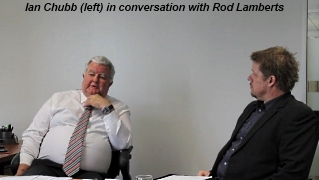|
|
|
|
|
|
|
News & Views item - June 2011 |
![]() The Chief Scientist Talks to ANU's Deputy Director of the Australian National
Centre for Public Awareness of Science. (June 25, 2011)
The Chief Scientist Talks to ANU's Deputy Director of the Australian National
Centre for Public Awareness of Science. (June 25, 2011)
Rod Lamberts is deputy director of the Australian National Centre for Public Awareness of Science at the ANU. Yesterday The Conversation published a 4,500 word transcript of a "conversation with Australia’s recently-appointed Chief Scientist, and former vice chancellor at ANU, Professor Ian Chubb".
By way of introduction: "Ian Chubb was appointed to the role of Chief Scientist on April 19 of this year following the departure of previous chief Penny Sackett, who left half-way through her term. Professor Chubb is a neuroscientist by training and has authored or co-authored 70 academic papers and one book. This conversation is not intended as a traditional media interview: it is a discussion between a leading academic and a senior figure in Australian science. It touches on a wide range of themes including:
the role of the Chief Scientist in Australian politics,
“trolls” and anonymous critics,
the damaging illusion of “balance” in the climate change debate,
supporting colleagues who come “under-fire” for their opinions,
reinvigorating science education in Australia,
why science matters to Jane and Joe Public.
A couple of excerpts:
Lamberts: How political do
you think this position is? How political would you like it to be?
Chubb: I don’t want it to
be political.
It’s not my job to defend government policy; it’s not my job
to go out there and talk about something that might have been based on
scientific advice but is actually the policy response to that advice.
So it’s not my business to talk about a carbon tax. I will
make sure that the government either has available to it the real expertise or
the advice we can give that might summarise some of that expertise so that they
can choose from the options given to them. That’s my role.
________________________
Lamberts: ...if there are
quite-strongly non-science-based policies going up – do you just need to say:
“Well it’s up to them, they’ve made the call”? Or would you be a little more
pressing?
Chubb: I think it would depend on what it was and how
significant it is. So I said this week in my Press Club address that if
politicians consistently ignore good advice then basically they’ll do a
disservice to the nation and they will have to answer for it at some point.
________________________
Lamberts: Possibly the
closest thing to real criticism I heard about your appointment from within the
university sector was: “He hasn’t been a practising scientist for ages”. What do
you think of that?
Chubb: Well, I mean, it’s true, but is that what I have to be?
Do I have to come here with ninhydrin-stained fingers actually to prove that I
can do the job? I don’t think so.
There are a lot better scientists in Australia than I was and
ever would be, but not many of them could do my job. They have a different
instinct, they have a different experience base, they have a different concept
of what the sort of role is and how you play it.
So I think you bring a whole lot of experience to a job like this and the important thing is that you are able to be a serious advocate for science, which means you know how science works, you know how scientists think, you know how science progresses knowledge, you know what the issues are for getting research funding or getting papers published – all of the things you need to know.
Again it’s a sort of easy
free-kick really: “Oh yeah, well he hasn’t stood at a bench for 25 years”. Well,
it’s true.
Lamberts: Well, I confess I was surprised by the criticism
because actually I think the last person I’d want in a job like this is someone
who has just stepped away from the bench.
Chubb: Yes, because they don’t know how the political system
works, necessarily – very few do. They don’t know how to manage and massage the
political system.
______________________________________________________________________________________
Well now Robert May, David King and John Beddington were practicing scientists when they were appointed personal adviser on science and technology-related activities and policies to the UK Prime Minister and the Cabinet, and head of the Government Office for Science. And in fact they continue to be practicing scientists.
John Holdern was a practicing scientist immediately prior to his appointment as Science Advisor to the President of the United States.
But in any case click on the link above and read the complete interview and determine for yourself if you're any the wiser about just exactly what Professor Chubb, with his staff of 10 to 12, will be doing to further the cause of STEM and STEM education in Australia.
We're also reminded of the physical definition of work: work is the amount of energy transferred by a force acting through a distance in the direction of the force. So if you haven't moved it (them?) you haven't accomplished any work.
On the other hand as Robert May indicated when addressing the Australian Academy of Science recently, one of the requisites for being an effective science advisor is to be lucky in regard to whom you're advising.